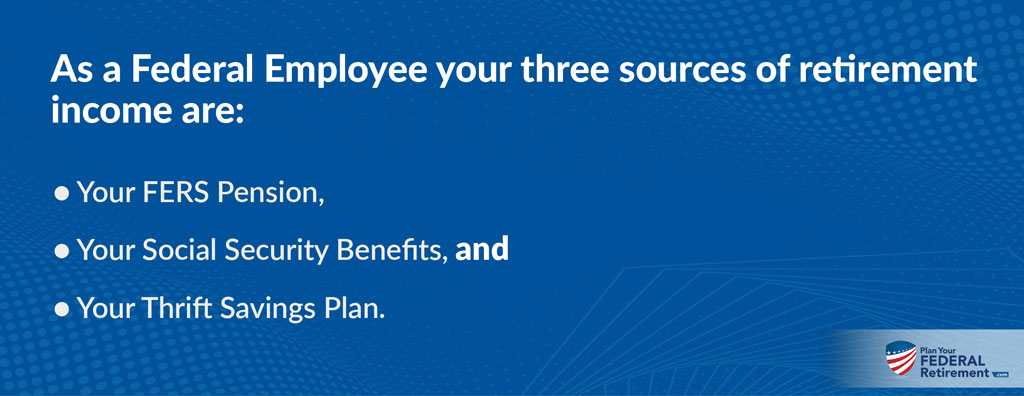“I am 65, born in (November) 1955. I’ve only been a Federal Civilian Employee for 5yrs this November. I’ve also withdrawn $7,000.00 last year for emergency reasons. Now if I decide to retire this year or by the next 6 months into next year, how must and from where will my retirement income comes from? 1. Social Security, 2. both Social Security and FERS, 3. both Social Security + FERS + TSP? How do I know, and How do I calculate how much monthly income and when is the best time for me to retire?” – Selea
Selena has given us a lot of information about her career in Federal Service but regrettably, not quite enough to answer the questions that she has. This often happens when we meet one on one with Federal Employees during our consultations; the Fed has what they feel is a very simple question about their retirement options but the answer is far more complicated.
Come on, you are a Federal employee – you should expect nothing with the government is quite “simple.” 🙂
When a Federal employee and their spouse wants to visit with one of our Financial Professionals with a question like Selena, we walk them through a process of gathering information so that we can provide them with as much information as possible in regards not only to their Federal Employee Benefits but also how those benefits fit into their greater financial plan.
With Selena’s question, let’s walk through that process so that we can gather information, ask questions and even draw some conclusions.
How much are you spending today, monthly?
One of the very first questions that our financial planners ask, once we start diving into answering retirement questions, is “How much are you spending today, monthly?”
Normally this is when we see some quick mental math being done and a lot of mental justification thoughts appearing like, “Well, when I retire I won’t…”
Before you start making the same assumptions let me dispel perhaps one of the biggest retirement myths that we have seen perpetuate: “When I retire, I will spend less money because I won’t be working.”
Think about something for a moment. There are 7 days in the week, 5 of the days in which you are working. Which days do you typically spend the most amount of money?
Saturday and Sunday. Why? Because those are your days off when you’re recreating, doing projects, catching up with friends, etc.
In retirement, what happens when every single day becomes just like a Saturday and Sunday?
Often times, we see Federal Employees spend MORE money during retirement because that is when the “rewards” start: the classes, the travel, the new hobbies, etc.
That is why when we build financial plans for Federal Employees, we take this into consideration. What you are used to spending today is what you will most likely want to continue spending in retirement.
Normally, the answer is that most people spend 100% of their net income. What is deposited into their bank account every two weeks is what they’re planning to spend monthly.
How much is your income in retirement going to be?
The next question is, “How much is your income in retirement going to be?” Here, we are going to work on solving for your Gross retirement income and your Net retirement Income. One of the MOST overlooked aspects of Federal Employee retirement planning is forgetting about taxes.
This brings us to the second most perpetuated myth we have seen people believe: “My taxes will be lower when I retire.”
That is not always the case. Not only because tax law is written in pencil, changing as Congress allows, but also because most Federal Employees forget that a significant portion of their retirement assets is in Tax-Deferred accounts. This means, when they withdraw their funds in retirement, they pay taxes on those withdraws in those tax-deferred accounts.
We want to know what your gross benefits are and then run a tax projection and estimate what your net income is going to be. Remember, we don’t spend the gross, we spend the net. Do not overestimate how much money you will have in retirement because you believed that your taxes will be lower. Rather, know whether or not they WILL be so that you can make the most informed financial decisions.
Cash Flow is King in Retirement.
Selena, we went through as much of your question as we could given the information that we had. Hopefully, you were able to get the information that you needed to reassess your situation.
If you have a question about your Federal Employee Benefits, let us know! We love to work with Federal Employees and answer their complex questions.
If you are not sure how much you should take out of your TSP in retirement then you NEED to take our 3 Critical Concepts Class for Federal Employees.
In our 3 Critical Concepts Class, we talk a lot about dynamic distributions and allocations.




One Response
I am 61 and have been under the FERS disability retirement since 2015. I will be reaching 62 this coming August 2023. What will I need to do prior to reaching my birthday? Will my FERS disability be recalculated automatically, or do I need to reach out to OPM prior to that date?
My high threes will be the last 3 years in which I have been under the disability retirement. Will those 3 years from 2021, 2022 and 2023 be the factors of my high three?
I would like to estimate what I will be getting for my pension. At 62 I will have 38 years of non-stop civilian service.
Please advise.